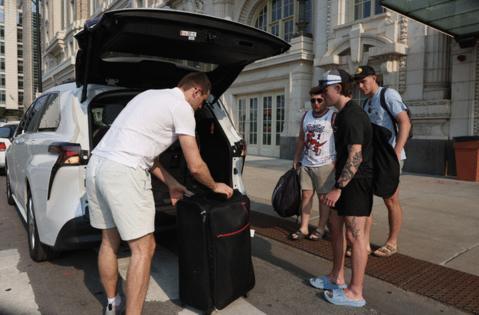Uber, unions reach labor peace deal in exchange for dropping driver wage hike ordinance
Published in Business News
CHICAGO — A contentious push to force Uber and Lyft to pay Chicago rideshare drivers more is settled for now after Uber and the unions behind the effort reached a labor peace deal.
The Illinois Drivers Alliance, anchored by the Service Employees International Union Local 1 and the International Association of Machinists Mechanics Union Local 701, announced Monday morning that Uber has agreed to not fight its efforts to organize an estimated 100,000 rideshare drivers across Illinois.
The deal came just before a scheduled City Council committee vote Monday afternoon on the pay raise package. And it tees up a high-stakes union organizing competition between the Drivers Alliance unions and the International Union of Operating Engineers Local 150, which is also trying to unionize drivers and reached a labor peace deal with Uber this year.
As a part of the deal, Uber agreed to support statewide legislation that would give drivers collective bargaining rights but keep them classified as independent contractors, Local 1 spokesperson Bailey Koch said. The unions have not secured a similar agreement from Lyft but are in conversations with the company, Koch said.
That legislation would allow the unions “to reach beyond city limits to lift up hundreds of thousands of drivers across Illinois,” Genie Kastrup, the president of SEIU Local 1, said in a statement about the deal, which was first reported by Crain’s Chicago Business.
Ronnie Gonzalez, special representative for the IAM’s Midwest region, said the legislation would give drivers “a seat at the table” to bargain over issues including wages, safety issues and deactivations.
Drivers want to keep their independent contractor classification, Koch said. “They want that flexibility,” she said.
In a statement, Uber spokesperson Josh Gold said the company “agrees that the best path forward is to work collaboratively on statewide legislation that protects the flexibility drivers consistently tell us they value most, while also creating a meaningful path to organizing.”
“We are committed to working to advance thoughtful, balanced policy that reflects the needs of today’s workers and supports innovation in the economy,” Gold said.
In a statement, Lyft said it was “committed to leading the effort to find a statewide solution that improves benefits and protections for drivers while preserving their flexibility and independence—and without sacrificing riders’ ability to afford the service.”
The company is “willing to work collaboratively with all stakeholders to pass legislation that prioritizes both drivers and riders,” and would advocate for reforms to improve drivers’ working conditions, it said.
The now moot City Council ordinance that aldermen were set to vote on Monday would have raised driver pay to $1.50 per mile and 62.5 cents per minute. It also would have established a $7 minimum driver payout for each trip.
Proponents argued the pay hike would have finally given drivers pay above minimum wage, but Uber and Lyft said the measure would have made ride costs skyrocket and forced them to put thousands of drivers out of work.
The ordinance also would have required fare breakdowns be shared with drivers and riders alike, added transparency regarding driver deactivations and enforced new driver safety measures.
And as the ordinance offering all those driver perks grounded to a halt Monday, sponsor Ald. Michael Rodriguez, 22nd, said he was “very happy with the tradeoff.”
“We are looking forward to everything that comes from organizing into a labor union. That’s better wages, increased safety and a voice at the table,” Rodriguez said. “My shoulders are a lot lighter today.”
Asked if he supported either the Drivers Alliance or Local 150 to represent rideshare drivers, Rodriguez said he was “not going to go there.”
Marc Poulos, executive director of Local 150’s labor-management group, touted success securing the state’s Workers Rights Amendment and industry-leading contracts when asked about the competing organizing efforts Monday.
“Local 150 is excited to provide a more holistic approach to ride share drivers by providing an opportunity to represent and regulate the ride share industry in a way that protects all workers engaged in the industry across the state,” he wrote in a statement.
Mayor Brandon Johnson’s administration was notably absent at a Drivers Alliance news conference announcing the deal Monday. Johnson carefully avoided publicly taking a side on the ordinance that pitted union against union and drivers against big business when asked questions in recent weeks.
Johnson’s administration continued to remain neutral behind closed doors and was not involved in the negotiations that landed the deal over the weekend, Rodriguez said.
©2025 Chicago Tribune. Visit at chicagotribune.com. Distributed by Tribune Content Agency, LLC.












Comments